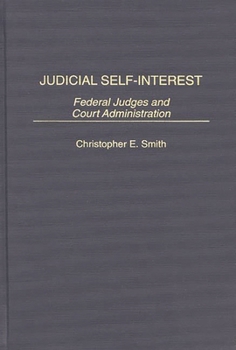Judicial Self-Interest: Federal Judges and Court Administration
This book examines the federal judiciary in light of political science research on the role of interests and interest groups in the making of public policy. The author finds that efforts of federal judges to shape court administration are guided, in part, by self-interest which consequently affects the development and results of judicial policies. He argues that we must recognize judges as self-interested political actors whose motivation and behavior patterns are comparable to other political and administrative actors. By examining the actions of federal judges on a series of illustrative issues--civil justice reform, judicial salaries, habeas corpus reform, and judicial bureaucratization--the book illuminates the ways in which the judges' self-interested actions affect the courts and society. Judicial self-interest is not portrayed here as bad or even unexpected, but as a motivational factor of significance for government, law, and society that should be recognized and harnessed appropriately.





